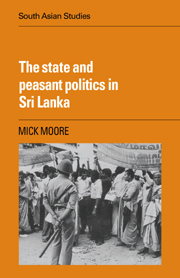Book contents
- Frontmatter
- Contents
- List of maps
- List of tables
- Acknowledgments
- Glossary of Sri Lankan terms
- Maps
- 1 Puzzles and agendas
- 2 Methods, scope and elaborations
- 3 Crown lands
- 4 Land reform
- 5 Pricing and agricultural services
- 6 Categorising space: urban–rural and core–periphery
- 7 A smallholder interest or smallholder interests?
- 8 Rural consciousness
- 9 Ethnic conflict and the politics of the periphery
- 10 The Sri Lankan polity
- 11 Concluding remarks
- Appendix 1 Results of general elections, 1947–77: percentage of parliamentary seats won
- Appendix 2 The myth of the plantation impact on the Sinhalese village: two accounts
- Notes
- Bibliography
- Index
- CAMBRIDGE SOUTH ASIAN STUDIES
5 - Pricing and agricultural services
Published online by Cambridge University Press: 05 March 2012
- Frontmatter
- Contents
- List of maps
- List of tables
- Acknowledgments
- Glossary of Sri Lankan terms
- Maps
- 1 Puzzles and agendas
- 2 Methods, scope and elaborations
- 3 Crown lands
- 4 Land reform
- 5 Pricing and agricultural services
- 6 Categorising space: urban–rural and core–periphery
- 7 A smallholder interest or smallholder interests?
- 8 Rural consciousness
- 9 Ethnic conflict and the politics of the periphery
- 10 The Sri Lankan polity
- 11 Concluding remarks
- Appendix 1 Results of general elections, 1947–77: percentage of parliamentary seats won
- Appendix 2 The myth of the plantation impact on the Sinhalese village: two accounts
- Notes
- Bibliography
- Index
- CAMBRIDGE SOUTH ASIAN STUDIES
Summary
Introduction
The previous two chapters have been concerned with land policy, and thus with the ‘land control’ aspects of agricultural production. The relatively extended treatment is justified by the emotive and political salience of land questions in contemporary Sri Lankan politics and by the convenience – from the scholarly point of view – of the form in which these issues have surfaced politically. For land policy has been punctuated by a few major breaks in policy, each associated with new legislation. The politics involved can be relatively easily grasped through an analysis of the events and debates surrounding each policy change. This is not the case with the policies treated in this chapter: attempts by the government to affect the ways in which smallholders use their land. Here we are much nearer the realm of ‘normal polities’: continual incremental policy changes; the more visible influence of established practice; the continual replication in debate of similar diagnoses and prescriptions; and the persistent influence on policy towards smallholders of the imperatives, pressures and constraints which affect policy, especially economic policy, more broadly. The latter point is especially salient in an economy such as Sri Lanka's which has been under the pressure of rapid population growth, almost continually declining terms of trade, and only mediocre aggregate growth performance. It follows that it is not always easy to discover the ‘real’ politics behind the policy issues discussed in this chapter.
- Type
- Chapter
- Information
- The State and Peasant Politics in Sri Lanka , pp. 85 - 120Publisher: Cambridge University PressPrint publication year: 1985

